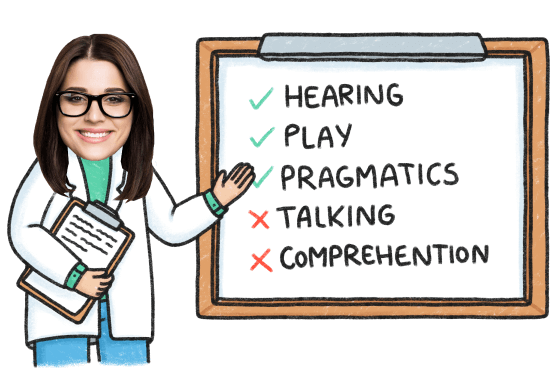IQ Test for Kids -- Why Should You Have Them Tested?
Feb 8, 2022 You most definitely heard of cognitive assessments - they are called IQ tests. Read this article to learn what IQ tests for kids consist of and when should you consider get your child tested.
Cognition is the mental process of acquiring knowledge and understanding through experiences, learning and our senses. Children are constantly learning – they are truly sponges when it comes to absorbing and retaining information from an early age. There may be times when a school professional, such as a teacher, may notice some strengths or weaknesses in your child’s ability to learn. This is when they may be referred for cognitive testing.
Boost Your Child’s Speech Development!
Improve language & communication skills with fun learning!

What is an IQ Test?
Another word for cognitive testing is IQ testing or Intellectual Quotient Test. A series of activities are administered to your child by a psychologist. With IQ test for kids, they will assess the following cognitive functions (ladybughouse.com, 2020):
- Verbal Comprehension – this area measures your child’s vocabulary and their ability to express general knowledge and information
- Visual Spatial – measures your child’s verbal reasoning, understanding, concept formation and knowledge
- Fluid Reasoning – measures the child’s ability to solve novel problems independent of previous knowledge
- Working Memory – measures the child’s ability to learn, manipulate and retain information to complete new tasks
- Processing Speed – measures the child’s ability to quickly process and make decisions about visual information
Why Should You Test Your Child’s IQ?
Typically, cognitive assessments or IQ tests for kids are performed when children start exhibiting issues in school. They may start struggling academically, have behaviors related to frustration and may start avoiding homework.
However, there are circumstances where children are referred for IQ testing when they are excelling in their classwork. Common concerns that teachers or other individuals may state in their referral may include:
- identifying intellectual disabilities – the cognitive/IQ testing for kids will rule out any learning disabilities
- identifying and diagnosing learning disabilities and disorders – if there is a true disability, the test will let the examiner know what areas are the weakest
- evaluating cognitive processing strengths and weaknesses – this is important for modification/accommodations that can take place in the classroom
- assessing for giftedness – cognitive testing can also determine if a child has above average intelligence and can be pushed to take higher level classes
- assessing for the impact of brain injuries
Types of Cognitive Assessments
The assessment performed will depend on your child’s age. They will be conducted in a small room, with just the psychologist and your child. If needed, breaks can be provided. The psychologist will also not use the word “test” with your child in order to minimize test anxiety. They may, instead, use words like “puzzles” and “games” to make it more fun for your child and to engage them easier.
Ages 4 to 7 years and 3 months – WPPSI-IV Wechsler Preschool & Primary Scale of Intelligence Fourth Edition
Ages 6 to 16 years 11 months – WISC-V Wechsler Intelligence Scale for Children Fifth Edition
Process of Cognitive Testing
So what happens first? There is a process when IQ test is recommended for a child. It just doesn’t happen overnight.
1. Initial appointment with parent and child
This is the first thing that will happen in the evaluation process. Background information is gathered from the parents, which will include developmental history, academic ability, medical issues, family relationships, and issues raised by the parents in order to gather a holistic picture of your child’s environment. Please be as honest and upfront with the psychologist as possible – it will only help paint an accurate picture of your child.
2. Testing over one or two sessions
This depends on your child’s ability and willingness to test, but the testing will most likely be done over one or two sessions. I typically do my speech and language evaluations over a period of 2-3 sessions because I find that after about 40 minutes, students start to become distracted.
3. Scoring and interpreting results
Each assessment will be scored and interpreted against standardized results. These scores will compare your child to same-aged peers.
4. Report writing
This is probably the longest part of the evaluation process. The behavioral observations of your child during testing will be recorded, along with the results of the testing, and recommendations.
5. Feedback session
The psychologist, along with teachers, the rest of the child study team, parents and possible other professionals (e.g., nurse) will discuss the outcomes of the testing in this session and provide recommendations for parents and schools.
It’s important to remember that any testing that is performed is done in order to help your child. Try not to make a big deal of it in front of your child so that they aren’t nervous or think that something is wrong. Make sure you prepare a list of questions that you want to ask before and after the evaluation process!
Have a question for our Speech Therapists?

